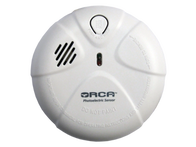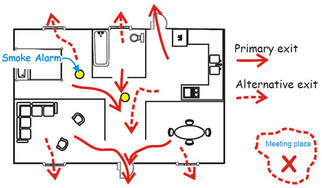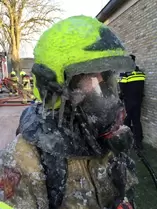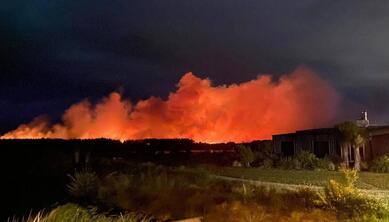Fire and Emergency NZ has a couple of websites packed with information on fire safety, whether it be for Landlords, Renters, Businesses, Rural, Urban, Marae or simply educating the kids...
Please read this stuff - the safety of life and property really depends on it...
Please read this stuff - the safety of life and property really depends on it...
SMOKE ALARMS SAVE LIVES - THE HONEST TRUTH....
What sort of smoke alarm should I install at home?
At a minimum, you should install one standard photoelectric alarm in the hallway closest to the bedrooms. Our local Risk Reduction Team can help you sort smoke alarms and their best placement. Book a home fire safety visit today.
- Fire and Emergency NZ personnel attend on average almost 4,000 house fires a year.
- In over 80% of those fires, smoke alarms were either not installed or not working.
- Most fire fatalities occur in homes, mainly while people are sleeping - you can't smell smoke when asleep!
- Smoke alarms are the best possible defense you and your family have from succumbing to a fire.
What sort of smoke alarm should I install at home?
- Long-life photoelectric type smoke alarms; they provide a minimum of 10 years smoke detection.
- They remove the frustration of fixing the 'flat battery beep' at inconvenient times.
- The cost of replacement batteries for standard alarms means the long-life one effectively pays for itself over its lifetime.
- Saves anyone, especially the elderly having to scale ladders to replace batteries when needed.
At a minimum, you should install one standard photoelectric alarm in the hallway closest to the bedrooms. Our local Risk Reduction Team can help you sort smoke alarms and their best placement. Book a home fire safety visit today.
Having a plan for what to do incase of an emergency is very important and can be the difference between a close call and a disaster. Create an escape plan for you and your family, HERE.
Some Winter tips from your friendly local Fire Brigade:
1. Dispose of ashes safely:
- Put them into a steel bucket when safe to do so (they can stay hot for days).
- Put heaps of water onto them.
- Mix the water into it, because if you don't, the water can settle on top and form a crust, not affecting the ash underneath at all.
- Leave it for a few days.
- Can put it on your garden.
2. Avoid chimney fires
- Make sure your chimney is checked and cleaned regularly.
- Don't use damp/wet wood, as it smokes more, causing more buildup in the chimney.
3. Check your smoke alarms!
- Test every month.
- Give them a gentle vacuum through to remove dust.
- Get 10 year photoelectric smoke alarms.
1. Dispose of ashes safely:
- Put them into a steel bucket when safe to do so (they can stay hot for days).
- Put heaps of water onto them.
- Mix the water into it, because if you don't, the water can settle on top and form a crust, not affecting the ash underneath at all.
- Leave it for a few days.
- Can put it on your garden.
2. Avoid chimney fires
- Make sure your chimney is checked and cleaned regularly.
- Don't use damp/wet wood, as it smokes more, causing more buildup in the chimney.
3. Check your smoke alarms!
- Test every month.
- Give them a gentle vacuum through to remove dust.
- Get 10 year photoelectric smoke alarms.
Firing up the BBQ:
Enjoying fireworks:
Campfire Do’s and Definitely Don’ts:
Having a burnoff? Need a permit? What's the fire season? CHECK IT'S ALRIGHT!!
Keeping your home safe in the summer and year-round:
- Never use a BBQ indoors or in an enclosed space – it’s not only a fire hazard but it can expose you or your family to dangerous and toxic gases.
- Place your BBQ well away from combustible objects or materials such as decks, fences or plants.
- Never leave your grill unattended when lit.
- Check your LPG Cylinders and lines to make sure they are properly fitted. Spray them with soapy water before using and if they bubble...you've got a problem!
- Clean the drip tray regularly.
Enjoying fireworks:
- Designate a responsible adult to be in charge of discharging all fireworks.
- Keep a water hose and bucket close at hand.
- Keep your audience a safe distance away and against the wind to avoid blowing debris in their direction.
- If you have a dud firework, place it in a bucket of water for at least 30 minutes before safely disposing of it.
- Keep sparklers away from children – they may seem like a safe novelty, but sparklers burn extremely hot and can easily set clothing ablaze.
- Avoid lighting them in enclosed spaces / under trees / in windy conditions.
Campfire Do’s and Definitely Don’ts:
- Check the rules of the area first to make sure fires are permitted.
- Always build your campfire where there’s no risk of it spreading – well away from tents, trailers, dry grass, leaves, overhanging tree branches or anything else that could ignite.
- Never use petrol/accelerants as an aid to starting a campfire and definitely never add it to an open flame as the flame could travel up the stream and into the container in your hand. Our natural reaction then is to throw it.
- Keep plenty of water and a shovel around to douse the fire when you’re done.
- Always put your campfire out with sand (if possible) AND water.
Having a burnoff? Need a permit? What's the fire season? CHECK IT'S ALRIGHT!!
Keeping your home safe in the summer and year-round:
- Test your smoke and carbon monoxide detectors and replace the batteries if needed.
- Check your fire extinguishers to ensure they are in good working condition.
- Make sure everyone in your home is familiar with your building's or your family’s fire escape plan.
- Check that all windows and doors used in case of evacuation remain unobstructed and open easily.











